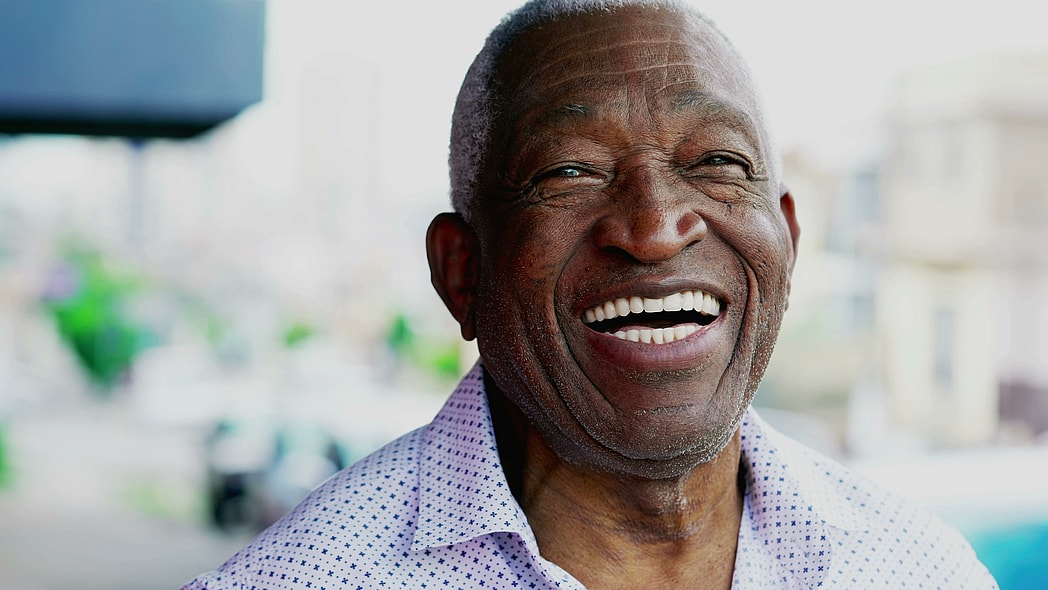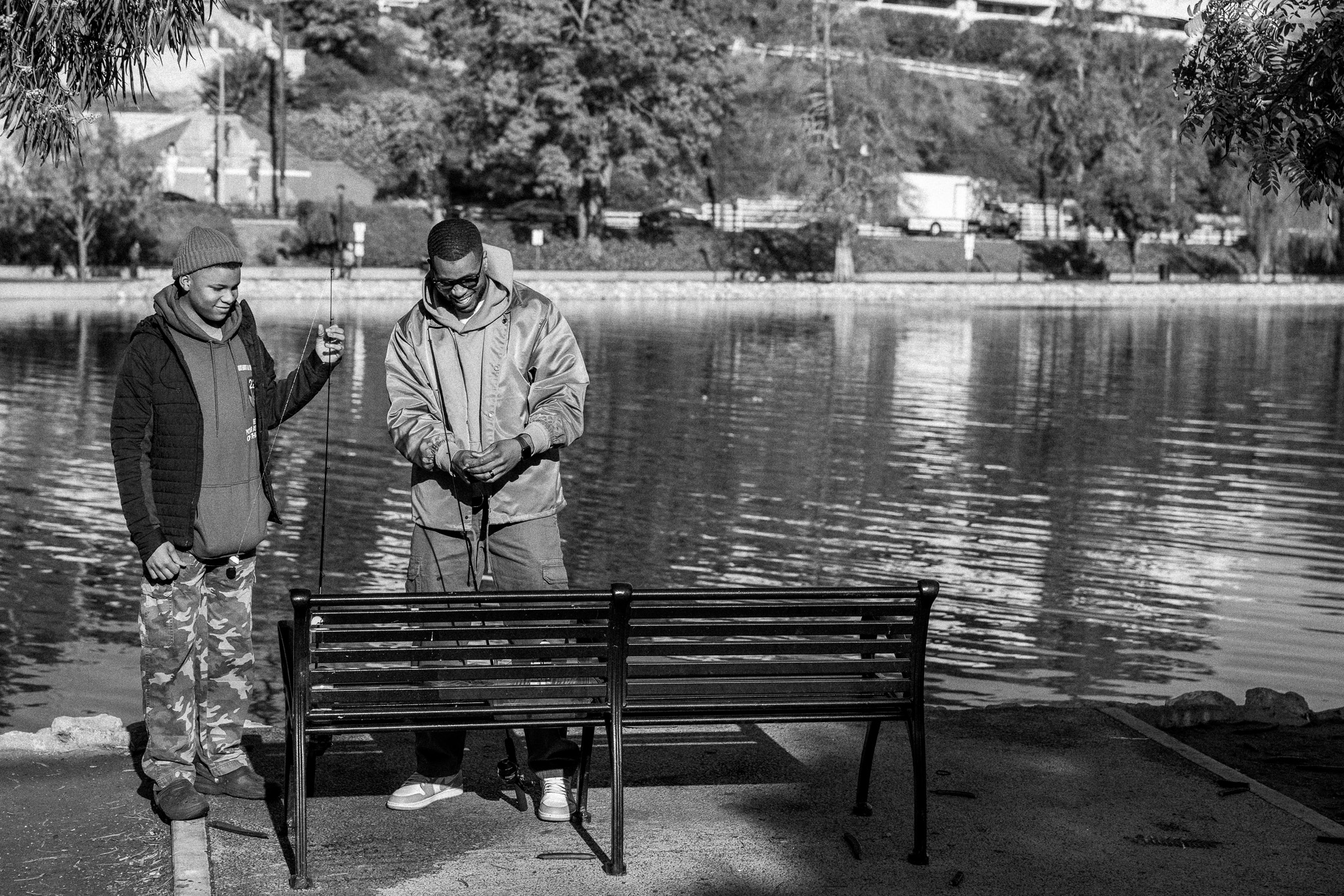Never underestimate the power of a photo — “Black Love” co-founder Tommy Oliver certainly doesn’t when creating his annual “Father Noir” visual memoir.
While photography is a celebrated and evocative medium, for many decades, the art form was frequently used as a means of critiquing, belittling, and degrading the Black citizens of this country. As Princeton professor Tina M. Campt highlighted in her book “Image Matters: Archive, Photography, and the African Diaspora in Europe,” photos “played a dual role in rendering the history of African diasporic communities, because of [their] ability to document and simultaneously pathologize the history, culture, and struggles of these communities.”
As author-educator bell hooks explained, to combat an increase in negative imagery in mainstream media that perpetuated negative stereotypes, Black people worldwide turned the camera into a “way to resist misrepresentation,” using it a political tool and form of resistance. Like his forebears, Oliver now uses photographs to debunk harmful stereotypes surrounding Black fatherhood.
“Fatherhood means the world to me,” Oliver told theGrio, revealing that despite, or perhaps due to not having his own father in his life growing up, he deeply values being a dad. “So, not seeing nearly enough positive imagery around black fathers, I decided to do something about it,” he explained.
Now in its fourth iteration, the Father Noir project not only showcases Black dads and their children but also the different types of father-child relationships that can exist. For instance, the series highlights actor Keith Powers and his father, Keith Powers Sr.; in an interview with theGrio, the “Perfect Find” actor revealed how funny and awkward shooting the campaign was because, despite having a great relationship with his father, the duo typically isn’t very affectionate.
“It was super awkward when we were shooting because my dad didn’t know what to do [at times],” Powers explained, jokingly admitting that some of the hugs felt robotic. “It was still fun to shoot it … just you realize a lot of things while shooting that [made me think] ‘Damn, we got some stuff to work on.’ But I don’t look at it as a super-negative thing. I think it’s very common within the Black community and [for] Black fathers [and is] definitely something that needs to be put on Front Street more so people can recognize and be aware of it.”
Recommended Stories
Just as the shoot made Powers realize the dynamics he and his father might need to work on, it also made him appreciate their unique relationship. While he could not remember the last time he and his father hugged, the actor vividly remembered the little moments with his namesake, whom he credits with influencing his musical tastes, charisma, character, and even the fastidious hygienic practices he continues to this day.
Like Powers, singer Eric Bellinger says the little moments are what stick out to him the most as he raises his two sons, Elysha and Eazy Bellinger.
“There are moments every day where it’s like, ‘OK, there’s my son, you know, here’s our family; we’re eating dinner, we’re going to sleep. But there are moments when … I feel a connection,” Bellinger shared with theGrio. “When those magic moments do happen, I always appreciate them. There’s like a twinkle in both of our eyes — whether it’s me and Eli or me and Eazy — when we can connect on [something]. Then we give each other this look, and it’s just like, these are the moments [that prove] why it has to be me [raising them], why I have to be here.”
Whether working in Hollywood or the music industry, each of the celebrity dads we spoke to emphasized the importance of being present in their children’s lives, no matter how busy their schedules may be. For actor Lance Gross, these special bonding moments can occur at home, building Lego sets or furniture with his son Lennon, or abroad, taking older daughter Berkeley on a daddy-daughter trip to Paris.
“It’s important to have time with each of your kids individually, just because, you know, you need that bonding time to connect and learn about each other,” Gross explained. “The biggest lesson my kids have taught me is that there’s always room for the heart to grow. Every day, I find myself [and] my heart just getting bigger through them.”
While the title of “dad” is often associated with being a provider, the dads of Father Noir noted the level of vulnerability that also comes with being a Black father today. Looking at the state of the “crumbling world,” Bellinger is especially mindful of the lessons he teaches his boys, putting a particular emphasis on positivity, love, and working to make an impact. Similarly, “P-Valley” star J. Alphonse Nicholson carries the same vulnerability he shows onscreen into being a father to his son and stepdaughter.
“I’ve learned to not tell my son, ‘Toughen up, man’ — or ‘Hey, no, you should shake that off,’ or ‘You shouldn’t be crying about that,’” Alphonse explained, sharing that, when it comes to his kids, he gets emotional himself at the littlest things. “Those [beliefs] are just things that [were] handed down to me — and after a while you realize, ‘No, I do want to cry,’ or ‘I don’t want to shake this off right now; I need some time to kind of process it.’ So [I’m] teaching them that it’s OK to be upset, but also allowing them to figure out and teaching them how to find out what those emotions are and deal with a problem.”
Regardless of whether a father embodies your hero, as did Gross’s, or was a stranger as was Oliver’s, Father Noir reinforces the fact that a child calling you “dad” is a gift that comes with great responsibility.
“Black fatherhood is everything. Being there for your kids, supporting them, loving them, nurturing them, helping them to become the best version of themselves is what it’s all about,” said Oliver. “I’m fortunate in that I get to do what I love for a living and [am] able to create stuff, but it’s nowhere close to being as important as my time with my kids; as being a father, and as the responsibility to be the type of person they can look to to nurture them, to support them, to love them, to do all those things. So ‘Black father’ represents love. It represents the future. It represents the hopes and dreams for what our kids can become and our role in helping to support them to reach that place.”

Haniyah Philogene is a multimedia storyteller and Lifestyle writer for theGrio covering all things culture. With a passion for digital media, she goes above and beyond to find new ways to tell and share stories.














